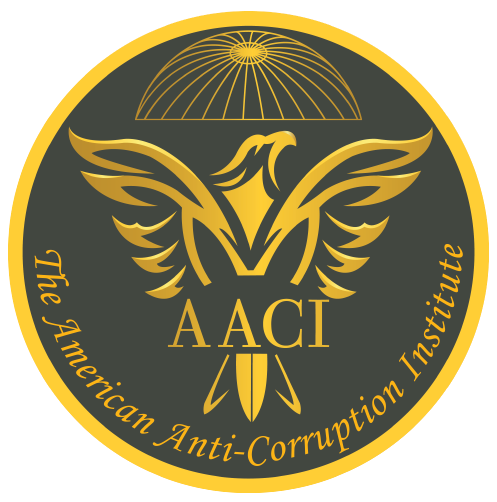CONTINUING PROFESSIONAL EDUCATION (CPE)
For Certified Anti-Corruption Manager (CACM) and Certified Anti-Corruption Expert Manager (CACEM)
The American Anti-Corruption Institute (AACI) requires all certified professionals to pursue continuing professional education (CPE) to sustain their competence, integrity, and readiness to address evolving corruption risks.
This policy outlines the annual CPE requirements and approved learning areas for Certified Anti-Corruption Managers (CACM) and Certified Anti-Corruption Expert Managers (CACEM).
1. Purpose
The purpose of this policy is to ensure that all AACI-certified professionals maintain a high level of professional competence in corruption prevention, deterrence, detection, and response; internal control; governance; and ethical leadership.
CPE strengthens professional credibility, supports measurable anti-corruption safeguards, and upholds The AACI Ten Principles of Fighting Corruption and its Standards on Fighting Corruption (SFCs).
2. General Requirement
All Certified Anti-Corruption Managers (CACM) and Certified Anti-Corruption Expert Managers (CACEM) must complete a minimum of 30 hours of CPE per calendar year, beginning January 1 following successful completion of the certification examination.
The CPE requirement is designed to maintain and enhance the certified professional’s competence and performance in areas related to:
- Corruption prevention, deterrence, detection, and response
- Internal control and governance
- Ethical leadership and integrity
- Financial management and decision-making
- Emerging technologies relevant to anti-corruption, including artificial intelligence (AI) and blockchain
3. Areas of Learning
A broad range of subjects may qualify for CPE credit, provided they are directly related to the certified professional’s role or The AACI’s areas of focus.
Acceptable topics include but are not limited to:
- Fraud and corruption prevention, detection, and investigation
- Corporate governance and board oversight
- Internal control, risk management, and compliance
- Business ethics and integrity
- Forensic accounting and due diligence
- Anti-Money Laundering (AML) and counter-terrorist financing
- Management and decision-making
- Financial reporting and auditing
Technology and innovation in corruption prevention, including:
- AI in compliance and governance
- Blockchain for transparency and traceability
- Data analytics and digital forensics
4. Annual Core Requirements
Every certified professional must complete:
- 3 hours in ethics, focusing on good governance, ethical decision-making, and integrity in management and finance.
- 2 hours in artificial intelligence and blockchain applications, addressing how emerging technologies affect corruption risks, control systems, and data governance.
These 5 hours count toward the 30-hour annual total.
5. Eligible Learning Activities
CPE credit may be earned through programs and activities sponsored or recognized by:
- The American Anti-Corruption Institute (AACI)
- Approved institutions, including accredited universities, international professional bodies, recognized government training institutes, and The AACI’s authorized strategic partners worldwide
- Other professional or academic organizations offering relevant, verifiable programs
Examples of qualifying activities:
- Formal courses, seminars, and workshops (in-person or online)
- Self-study courses with verified completion
- Research, publication, or presentation of technical papers
- Development or delivery of anti-corruption training
- Participation in structured AI or blockchain learning programs
- Attendance at professional conferences, including AACI events
- On-the-job training or unstructured informal learning does not qualify.
6. Carryforward of Excess Hours
If more than 30 hours are completed in a given year, up to 15 hours may be carried forward to the next year.
7. Verification and Documentation
Certified professionals are responsible for maintaining documentation supporting their CPE claims for at least three years.
Documentation must include:
- Course or event title
- Sponsoring organization
- Dates of attendance
- Number of CPE hours earned
- Proof of completion (certificate, transcript, or confirmation email)
8. CPE and Membership Compliance
To maintain active status and use the CACM or CACEM designation, certified professionals must:
- Complete the required annual CPE hours.
- Maintain good standing with The AACI, including payment of annual membership dues.
Those who fail to comply will be designated inactive and must complete at least 60 hours of acceptable CPE within the next calendar year to regain active status.
9. Retired Status
Certified professionals who are fully retired and over the age of 60 may apply for Retired Status, which exempts them from CPE requirements while allowing continued association with The AACI.
10. Encouraged Learning Themes
To remain at the forefront of anti-corruption knowledge, The AACI encourages certified professionals to pursue CPE in the following emerging areas:
- AI-driven compliance monitoring
- Blockchain-enabled transparency in procurement
- Ethics of automation and algorithmic decision-making
- ESG (Environmental, Social, and Governance) integrity
- Cross-border enforcement and regulatory cooperation
- Digital whistleblowing systems
- Cybercrime, data privacy, and digital integrity
11. Approved Institutions (Clarification)
“Approved institutions” include:
- Accredited universities and higher education institutions
- Recognized professional bodies (e.g., accounting, auditing, compliance, or governance institutes)
- Governmental and intergovernmental agencies offering anti-corruption training
- AACI-authorized strategic partners and training affiliates
- Online learning platforms approved by The AACI for CPE credit
Programs outside these categories must be pre-approved by The AACI to qualify for credit.
12. Review and Policy Updates
This policy is reviewed periodically by The AACI’s Standards and Certification Board to ensure alignment with technological, regulatory, and professional developments—particularly those involving AI, blockchain, and digital governance.
For AACI-approved courses and learning programs that count toward your annual CPE, please visit our Training and Events section.
Together, Empowering Tone at the Top
© 2025 The American Anti-Corruption Institute (AACI)
All rights reserved.
For more information, contact the Exam Unit.
P.O. Box 27346
Tempe, AZ 85285
